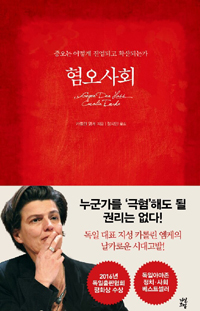Books | Carolin Emcke’s Gegen den Hass [Against Hate] (2016)
18-10-11 09:41페이지 정보
작성자 최고관리자 작성일18-10-11 09:41 조회3,277회 댓글0건관련링크
본문

| Title |
Carolin Emcke’s Gegen den Hass [Against Hate] (2016)
(Published in Korean as Hyeomo Sahoe by Dasanchodang in 2017; translated by Jeong Ji-in)
| Recommendation |
I recently saw a newspaper article about the very unwelcome phenomenon of growing anti-Chinese sentiment in Korean universities. Though domestic students find themselves doing group projects and sharing their living spaces with an increasing number of international students, they are struggling to build successful relationships in these situations because of problems such as cultural differences and language barriers. In Gegen den Hass, Emcke analyzes how the discomfort that arises from such friction manifests as or develops into hate by looking at examples of historical incidents and issues of race, gender, immigration, and sexuality.
Social scientists have come up with many diagnoses for contemporary society; they call it “risk society”, “burnout society”, “hate society”, “disparity society”, and so on. However, it is indisputable that one of the keywords needed to analyze today’s Korean society is indeed “hate”. We are witnessing the process of hate growing beyond an individual emotion to become a group sentiment, and then developing further into a form of violence filled with unshakable conviction. It is time for a serious discussion about the essential nature of hate and whether its expression should be socially acceptable.
Emcke, a German journalist and scholar who has studied politics and philosophy, provides deep and detailed analyses of hate and other issues of structural power such as war and violence. She emphasizes the points that hate isn’t something that appears suddenly one day, but something that people are trained and taught to have, and that when we look into the mechanisms of discrimination and exclusion that create hate, we find many cases of people explaining the “us” group to which they belong through the concepts of homogeneity, naturalness, and purity. The author sees the standard for judging homogeneity, as something that some people have the right to use and others don’t, as very arbitrary, and the concept of a “single-race nation” as nothing but a construction. She also explains that, by emphasizing their group’s naturalness in order to promote its superiority, people label certain attributes or ways of life as "unnatural" or "abnormal", and that by emphasizing “unadulterated” purity, they disparage hybridism and pluralism.
Emcke asks us to consider who benefits from the spread of hate and fear, and further argues that people who do not themselves engage in this but sympathetically tolerate others’ behavior thereby enable and amplify hate. This last point, in particular, should serve as a warning to the many people who are concerned about expressions of hate these days but reluctant to involve themselves in the situation. It makes me wonder if I should keep using the popular Korean slang word geukhyeom (“extremely hated”) so lightly.
Yookyung Bae, Senior Expert Coordinator of Diversity Council
댓글목록
등록된 댓글이 없습니다.